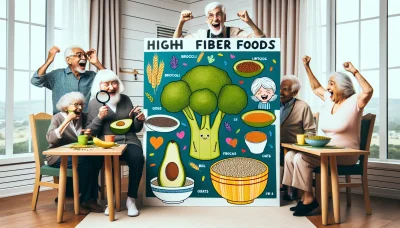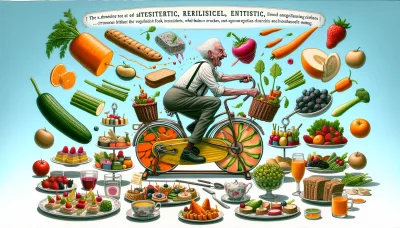Diet after a heart attack Quiz
Test Your Knowledge
Question of
Understanding Heart-Healthy Eating Post-Heart Attack
Fundamentals of a Cardiac Diet
- Limiting Saturated and Trans Fats
- Incorporating Omega-3 Fatty Acids
- Choosing Whole Grains
Importance of Portion Control
- Recognizing Serving Sizes
- Mindful Eating Techniques
- Tools and Apps for Measuring Portions
Hydration and Heart Health
- Benefits of Water for Cardiac Patients
- Herbal Teas and Heart Function
- Limiting Caffeine and Alcohol Intake
Nutrients Essential for Heart Attack Recovery
Role of Dietary Fiber in Heart Health
Soluble vs. Insoluble Fiber
Understanding the difference between soluble and insoluble fiber is crucial for heart health. Soluble fiber helps to reduce cholesterol levels, while insoluble fiber aids in digestion and regularity.
High-Fiber Foods to Include
Incorporating high-fiber foods like fruits, vegetables, whole grains, and legumes into your diet can significantly benefit heart health.
Fiber Supplements: Pros and Cons
While fiber supplements can help meet daily fiber requirements, they shouldn't replace whole foods rich in fiber due to the lack of additional nutrients found in natural sources.
Importance of Antioxidants
Antioxidant-Rich Foods
Foods high in antioxidants, such as berries, nuts, dark chocolate, and green leafy vegetables, can protect the heart by reducing oxidative stress and inflammation.
The Impact on Inflammation
Antioxidants play a significant role in reducing inflammation in the body, which is crucial for recovering from a heart attack and preventing future cardiac events.
Balancing Antioxidants with Other Nutrients
While antioxidants are vital, it's essential to maintain a balanced diet that includes a variety of nutrients to support overall heart health.
Balancing Electrolytes and Heart Function
Potassium's Role in Cardiac Recovery
Potassium is critical for heart health, helping to regulate heartbeat and blood pressure. Foods rich in potassium include bananas, oranges, and potatoes.
Magnesium and Heart Rhythm
Magnesium supports heart rhythm and can be found in foods like almonds, spinach, and whole grains.
Monitoring Sodium Intake
Reducing sodium intake is crucial for heart attack recovery, as excessive sodium can lead to high blood pressure and strain on the heart.
Meal Planning Strategies for a Healthy Heart
-
Creating a Balanced Meal Plan
- Structuring Your Plate : Focus on filling half your plate with fruits and vegetables, a quarter with whole grains, and the remaining quarter with lean proteins.
- Weekly Meal Prep Tips : Dedicate a few hours each week to prepare and store meals, making healthy choices easy and accessible throughout the week.
- Diversifying Your Diet : Incorporate a variety of foods in your diet to ensure you get all necessary nutrients. Try new fruits, vegetables, and whole grains regularly.
-
Smart Grocery Shopping for Heart Patients
- Reading Nutrition Labels : Learn to understand and compare nutrition labels, focusing on low sodium, low sugar, and high fiber options.
- Heart-Healthy Shopping List Essentials : Stock up on fresh produce, whole grains, lean proteins, and healthy fats like nuts and seeds.
- Avoiding Processed Foods and Sugars : Limit the purchase of pre-packaged snacks, ready meals, and sugary drinks, opting for whole foods instead.
-
Adapting Traditional Recipes to Heart-Healthy Versions
- Healthy Cooking Techniques : Embrace methods like grilling, baking, steaming, or stir-frying to reduce the need for added fats.
- Substituting Ingredients for Better Health : Use herbs and spices instead of salt to flavor dishes, opt for whole grain versions of pasta and bread, and choose lean cuts of meat.
- Flavoring Food Without Salt : Experiment with a variety of herbs, spices, and citrus to add flavor to your meals without the need for salt.
Managing Cholesterol and Blood Pressure Through Diet
Foods That Naturally Lower Cholesterol
-
Plant Sterols and Stanols
-
Nuts and Seeds for Heart Health
-
The Power of Beans and Legumes
Dietary Approaches to Stop Hypertension (DASH)
-
Principles of the DASH Diet
-
Sample DASH Diet Menu Ideas
-
Success Stories and Testimonials
Understanding the Link Between Sugar and Hypertension
-
Effects of Sugar on Blood Pressure
-
Identifying Hidden Sugars in Food
-
Healthy Alternatives to Satisfy Sweet Cravings
The Mediterranean Diet's Role in Heart Health Recovery
Key Components of the Mediterranean Diet
- Emphasis on Fruits and Vegetables
- The Role of Healthy Fats: Olive Oil and Nuts
- Selecting Seafood Over Red Meat
Cultural Influences on the Mediterranean Lifestyle
- Traditional Mediterranean Eating Patterns
- The Social Aspect of Eating
- Physical Activity as a Pillar of Health
Success Stories: Recovering with the Mediterranean Diet
- Personal Accounts of Improved Health
- Research Findings on Longevity and Wellness
- Adapting Mediterranean Habits to Other Cultures
Vegetarian and Vegan Diets for Heart Disease Management
-
Nutritional Considerations for Plant-Based Diets
- Protein Sources for Vegetarians and Vegans
- Ensuring Adequate Vitamin B12 Intake
- The Importance of Iron and Zinc from Plant Sources
-
Overcoming Challenges in Transitioning to Plant-Based Eating
- Dealing with Social Settings and Dining Out
- Finding Plant-Based Alternatives to Favorite Foods
- Meal Planning and Preparation Tips
-
Success Stories: Heart Health Improvements on Plant-Based Diets
- Documented Cases of Reversed Heart Disease
- The Impact on Cholesterol and Blood Pressure Levels
- Lifestyle Changes Accompanying Diet Adjustments
Long-Term Dietary Maintenance for Heart Attack Survivors
Setting Realistic Goals for Sustained Heart Health
- Short-Term vs. Long-Term Dietary Objectives
- Celebrating Milestones and Progress
- Coping with Setbacks and Relapses
The Role of Support Systems in Dietary Adherence
- Involving Family and Friends in Your Journey
- Joining Support Groups and Communities
- Working with a Dietitian or Nutritionist
Staying Informed on the Latest Heart Health Research
- Keeping Up with Nutritional Studies
- Innovations in Heart-Healthy Food Products
- The Evolving Science of Cardiac Nutrition












